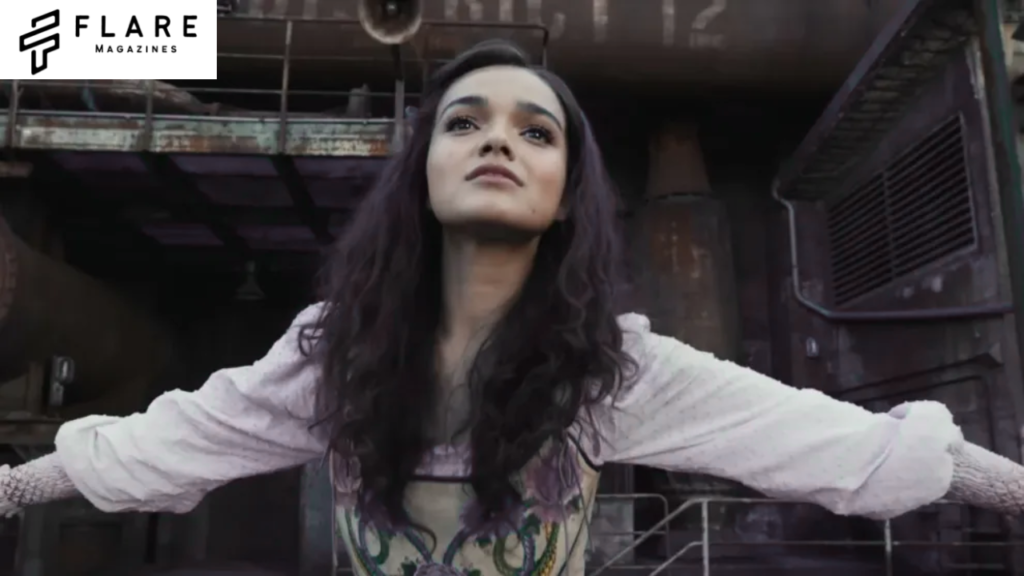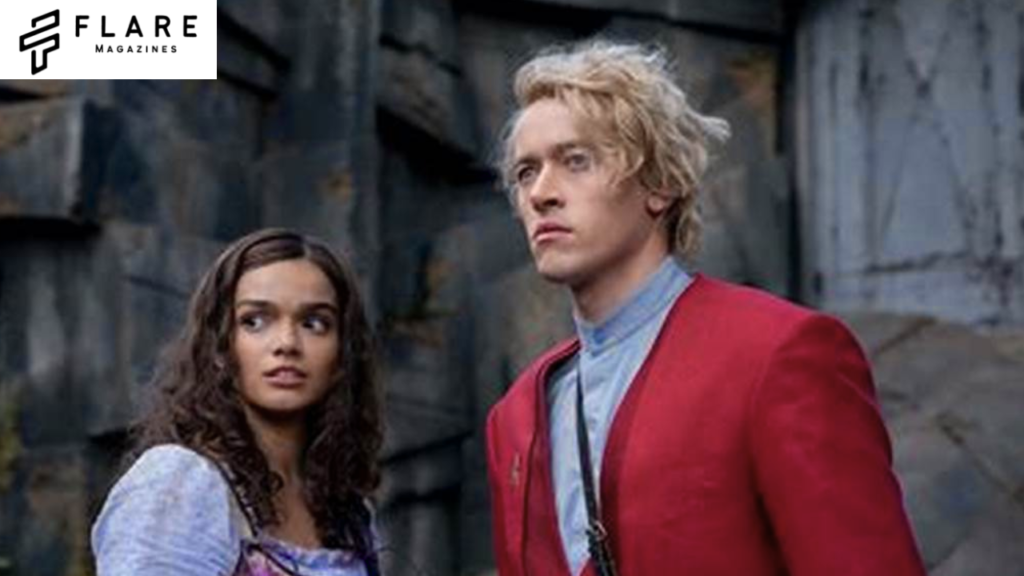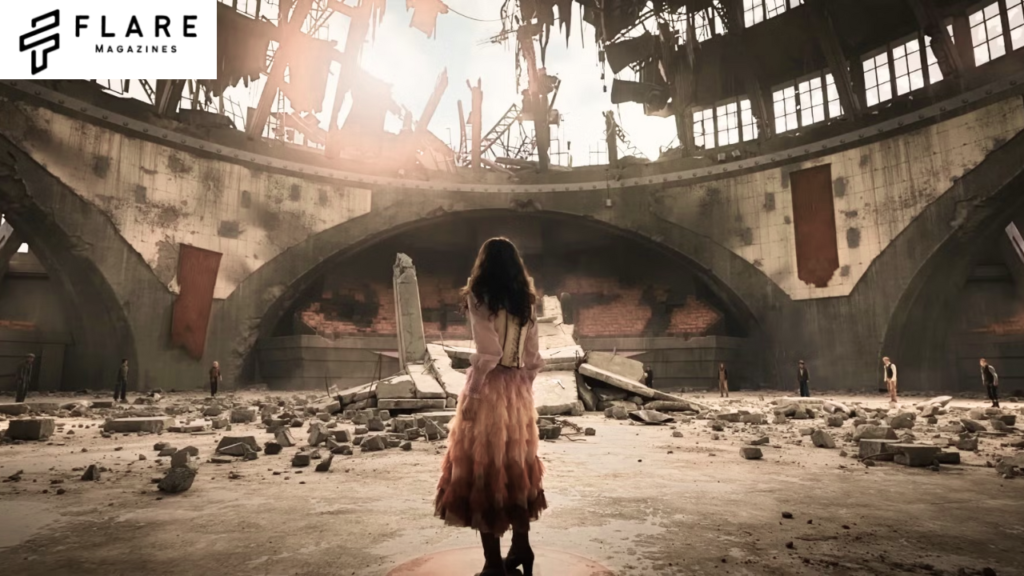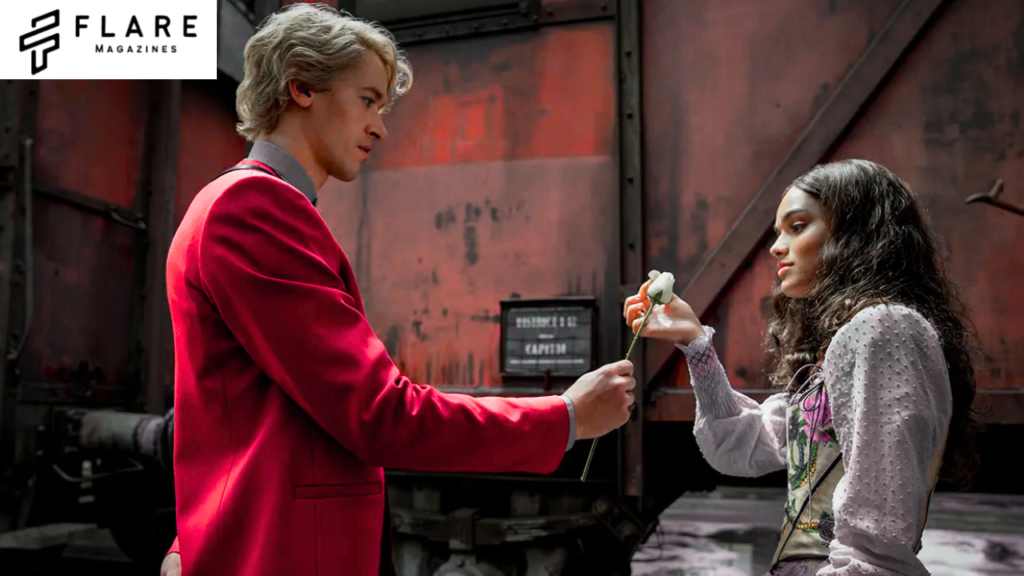Set decades before Katniss Everdeen’s defiant “I volunteer as tribute!”, The Hunger Games: The Ballad of Songbirds & Snakes delves into the sinister origins of one of Panem’s most ruthless leaders—Coriolanus Snow. This gripping prequel by Suzanne Collins transports readers back to the aftermath of the Dark Days, where a young Snow, still far from the tyrannical president he will become, is assigned to mentor District 12’s female tribute, Lucy Gray Baird, in the 10th annual Hunger Games. What unfolds is a tale of ambition, survival, and the corrupting nature of power, revealing how the boy who once fought for glory becomes the man who will stop at nothing to control a nation.
Blending political intrigue, moral dilemmas, and the raw brutality of the early Games, The Ballad of Songbirds & Snakes redefines the legacy of The Hunger Games saga. With its haunting exploration of fate, manipulation, and the thin line between love and obsession, this novel challenges readers to question: Was Snow always a monster, or did the Capitol—and the Games—make him one?
Panem in Ashes: The Historical Crucible
- The Raw Scars of Rebellion: Unlike the technologically advanced, spectacle-obsessed Capitol familiar from the original trilogy, the Panem of 10 years post-“Dark Days” resembles a war-ravaged society barely clinging to reconstruction. Buildings bear the pockmarks of artillery fire, food scarcity grips even elite families like the Snows, and the social fabric remains taut with mutual distrust between victors and vanquished. This setting provides the essential context for Snow’s worldview—a world where the Capitol’s victory feels fragile, justifying increasingly brutal measures to maintain control. Dean Casca Highbottom’s creation of the Hunger Games emerges not as triumphant punishment but as a morally bankrupt experiment born from wartime bitterness and pharmacological haze, a fact that haunts his morphine-addicted existence 914. The Games themselves are primitive, violent affairs held in a crumbling sports arena, lacking the sophisticated traps, genetically engineered horrors, or audience engagement tactics Snow would later pioneer. Tributes are treated like feral animals, caged in a zoo and denied basic dignities, reflecting the Capitol’s view of districts as inherently subhuman—a perspective Snow initially questions before weaponizing.
- Snow’s Gilded Cage: Eighteen-year-old Coriolanus Snow (Tom Blyth) inhabits a precarious space within this fractured society. The once-wealthy Snow family now survives through elaborate performative poverty—selling heirlooms, repainting faded clothes, and subsisting on cabbage water while maintaining the facade of aristocratic privilege. Their penthouse, adorned with portraits of better days, becomes a potent symbol of decaying grandeur. Coriolanus’s desperate need to restore his family’s status fuels his every action, creating audience empathy even as his methods grow disturbing. His assignment as mentor to the female tribute from District 12—seen as a humiliating death sentence for his academic ambitions—is the first domino in a chain reaction that will force him to confront his own capacity for ruthlessness 915. As he confides to his cousin Tigris (Hunter Schafer), “Without the prize money, University is impossible. We starve. It’s that simple.” This tangible desperation makes his subsequent moral compromises tragically understandable, if not excusable.

The Songbird and the Strategist: Dual Protagonists in Opposition
- Lucy Gray Baird: The Performer as Revolutionary: District 12’s tribute enters the narrative not as a weaponized survivor like Katniss, but as a performative dissident whose artistry becomes her rebellion. When her name is drawn at the reaping, Lucy Gray (Rachel Zegler) responds not with terror, but by defiantly singing “The Old Therebefore” as she descends the stage, simultaneously slipping a venomous snake into the dress of Mayor Lipp’s vindictive daughter. This act establishes her core identity: a member of the Covey (a nomadic musical group marginalized even within District 12) who understands the power of symbolic resistance. Her songs—rooted in Appalachian folk traditions—function as covert protests, historical records, and emotional lifelines 1416. Unlike Katniss’s reluctant heroism, Lucy Gray thrives on connection, using charm and vulnerability strategically to disarm enemies and manipulate audiences. Yet beneath the performative flair lies sharp intuition; she recognizes Snow’s ambition early, telling him, “You don’t convince me you’re sorry. You convince yourself.” Her relationship with Snow is less a love story than a mutual survival pact layered with performative affection, making its eventual fracture inevitable.
- Coriolanus Snow: The Architect in Embryo: Tom Blyth’s portrayal masterfully navigates Snow’s duality—surface charm masking calculating pragmatism. Early scenes showcase his performative empathy: comforting a sobbing classmate, delivering meticulously rehearsed compliments to powerful figures, and advocating for tributes’ dignity not from moral conviction, but because he recognizes its strategic value in making the Games more palatable. His proposal to gamify the Hunger Games with betting and sponsor gifts—innovations that define the future Games—reveals his genius for psychological manipulation 514. The film subtly signals his internal shift through visual motifs: his increasingly controlled posture, the way shadows fall across his face during pivotal decisions, and his growing association with white roses (a symbol he cultivates to mask the scent of decay). His moral descent isn’t a plunge but a staircase of compromises: first smuggling Lucy Gray food, then facilitating poison to kill her rivals, later murdering a tribute to protect Sejanus, and finally orchestrating betrayals that secure his power. Each step is justified as necessity, revealing Collins’ central thesis: tyranny isn’t born full-formed; it’s constructed choice by rationalized choice.
The 10th Hunger Games: Birth of a Spectacle
- From Punishment to Entertainment: The raw brutality of the early Games serves as a narrative crucible. Held in a dilapidated sports arena littered with debris, the tributes lack training, stylists, or even basic medical care. Viewership is dwindling—Capitol citizens find the gratuitous violence distasteful rather than entertaining. Dr. Volumnia Gaul (Viola Davis), the philosophically deranged Head Gamemaker, recognizes this threatens the Games’ purpose as a tool of control. Her solution: introduce mentors to “humanize” the tributes. This innovation, forced upon a reluctant Snow, becomes the laboratory where he develops his most insidious contributions: the theatricalization of suffering. His understanding that narrative drives engagement leads him to craft Lucy Gray as the “songbird” underdog—a prototype for Katniss’s “Girl on Fire” persona decades later 114. His manipulation of audience sympathy through interviews, gifts, and orchestrated moments (like Lucy Gray’s singing) marks the Games’ evolution from crude punishment to sophisticated propaganda. The bombing of the arena by rebel sympathizers mid-Games further radicalizes Snow, cementing his belief that only overwhelming, terrifying control can prevent chaos.
- Moral Contamination & Complicity: The Games force mentors into intimate complicity with the Capitol’s violence. Sejanus Plinth (Josh Andrés Rivera), Snow’s morally conflicted classmate from District 2, becomes the story’s tragic counterpoint. His attempts to help tributes—smuggling food to Marcus, demanding humane treatment—stem from genuine empathy but lack strategic cunning. His fate—hanged as a traitor after being betrayed by Snow—illustrates the lethal cost of moral purity in a corrupt system. Snow, conversely, survives by internalizing Gaul’s philosophy: “Control is fragile. Chaos is the only truth”. His survival actions—killing tribute Bobbin during the arena bombing, manipulating snake muttations using Lucy Gray’s scent—demonstrate his growing aptitude for brutality masked by rationalization. The film’s arena sequences, filmed with gritty, handheld urgency rather than sleek futurism, emphasize the visceral horror that later Games would sanitize with spectacle 35. This rawness forces both Snow and the audience to confront the barbarity underlying the Capitol’s “civilizing” mission.

Ideological Warfare: Philosophy as Weapon
- Gaul’s Pedagogy of Cruelty: Dr. Volumnia Gaul operates as Snow’s philosophical sire, her laboratory (a grotesque menagerie of mutated creatures) serving as a physical manifestation of her worldview. She personifies social Darwinism fused with nihilism, believing humanity’s inherent savagery necessitates institutions like the Games to channel violent impulses into “productive” outlets. Her experiments—like the rainbow-hued snake mutts designed to induce hallucinations—are not mere weapons but theatrical proofs of her theories about human nature 14. Her mentorship of Snow involves stripping away his pretensions to inherent superiority, forcing him to acknowledge his own capacity for violence: “You killed for him [Sejanus]. What was that? Instinct? Or something more primitive?” Gaul recognizes Snow’s genius lies not in compassion, but in his ability to aestheticize control—to make domination visually compelling and emotionally resonant. Her ultimate victory isn’t securing a Games victor, but recruiting Snow as her intellectual heir.
- Highbottom’s Haunted Pragmatism vs. Snow’s Ascendant Ruthlessness: Dean Casca Highbottom (Peter Dinklage), the Games’ original architect, embodies the corrosive weight of guilt. His creation, conceived as a drunken college satire, was twisted into reality by Crassus Snow (Coriolanus’s father). Addicted to morphling to numb his remorse, Highbottom perceives Snow’s ambition as a reincarnation of his father’s ruthless pragmatism. His attempts to thwart Snow—assigning him District 12, later expelling him—stem not from malice, but from a desperate desire to prevent history from repeating. Their final confrontation, where Snow poisons Highbottom with the same method used against his political rivals in Mockingjay, represents the triumph of unbridled ambition over weary conscience 914. Highbottom’s dying words—”It doesn’t end with you, Snow. It never ends”—acknowledge the cyclical nature of the violence he unleashed. Snow’s retort—”It ends when we win”—reveals his embrace of perpetual war as governance.
The Wilderness of the Soul: District 12’s Point of No Return
- Love as Strategic Vulnerability: Snow’s banishment to District 12 as a Peacekeeper following his expulsion becomes the narrative’s third act crucible. Reunited with Lucy Gray, he experiences fleeting moments of authentic connection, shedding Capitol pretensions. He participates in Covey gatherings, hunts in the woods, and envisions a life unburdened by legacy. However, this idyll is poisoned by persistent paranoia and ingrained superiority. His inability to trust Lucy Gray—particularly regarding her former lover, Billy Taupe—stems from his projection of his own transactional worldview onto others. When offered a path to officer training (and a return to power), his relief reveals his true priority: status over solidarity. The film visually contrasts Snow’s crisp, white Peacekeeper uniform against the earthy tones of District 12, emphasizing his inescapable alienation from the district’s communal spirit 514.
- The Betrayal Cascade: Snow’s moral unraveling accelerates in the districts. His betrayal of Sejanus—recording his rebel sympathies for Gaul—isn’t impulsive but coldly strategic, eliminating a liability while ingratiating himself with power. His murder of Mayfair Lipp (to protect Lucy Gray) and subsequent framing of Spruce expose his mastery of political deception. The planned escape north with Lucy Gray becomes less a romantic flight than a tactical retreat. When he discovers weapons at the cabin—potentially linking him to rebel activities—his immediate calculation isn’t confession, but Lucy Gray’s elimination as a witness. The film’s chilling climax in the rain-drenched woods, scored only by ambient noise and Lucy Gray’s distant singing, strips away all pretense. Snow’s decision to fire blindly into the mist where she hides marks his final transformation: the sacrifice of love, empathy, and moral ambiguity at the altar of self-preservation. His return to the Capitol isn’t a defeat, but a coronation 14.

Cinematic Alchemy: Translating Theme into Image and Sound
- Visual Storytelling and Symbolic Motifs: Director Francis Lawrence and cinematographer Jo Willems employ distinct visual palettes to trace Snow’s journey. The Capitol’s early scenes use desaturated opulence—gilded but gloomy interiors, uniforms faded or ill-fitting, food sparse despite elaborate presentations—to convey its postwar austerity. The Games’ arena is rendered in gritty, chaotic handheld shots, emphasizing primal violence. District 12, conversely, bursts with earthy warmth—golden-hour lighting on lakes, vibrant Covey costumes, crowded taverns alive with music—creating a stark contrast that makes Snow’s rejection of this world more tragic. Key motifs reverberate: White roses transition from his mother’s grave to symbols of manufactured purity masking decay. Snakes evolve from Lucy Gray’s rebellious weapon to Snow’s emblem of hidden danger. Birds (songbirds, jabberjays, mockingjays) symbolize the uncontrollable nature of hope and voice, foreshadowing Snow’s future war against their significance 516.
- The Ballad’s Sonic Landscape: Music functions as Lucy Gray’s weapon and legacy. Composer James Newton Howard interweaves Appalachian folk melodies (“The Hanging Tree,” “Deep in the Meadow”) with darker, more dissonant Capitol themes. Rachel Zegler’s vocals—raw, haunting, and defiant—anchor the soundtrack. Songs like “Pure as the Driven Snow” and “Nothing You Can Take From Me” are diegetic acts of resistance, weaponizing authenticity against Capitol artifice. The score’s most chilling choice is the recurrence of “The Hanging Tree” melody—later Katniss’s revolutionary anthem—as a minor-key motif associated with Snow’s moments of moral compromise, suggesting Lucy Gray’s enduring, unintended influence on the rebellion that would destroy him 16.
Resonance and Reckoning: Why the Prequel Matters
- Beyond Villain Origins: A Systemic Autopsy: The Ballad of Songbirds & Snakes transcends the “origin story” label by refusing to blame Snow’s tyranny solely on individual pathology. Instead, it meticulously dissects the ecosystem of complicity that cultivates authoritarianism: the economic desperation Snow exploits and experiences; the intellectual justifications provided by Gaul; the passive complicity of citizens who accept spectacle over substance; the cowardice of elites like Highbottom, who despise the system yet perpetuate it. Snow isn’t an aberration but the logical product of a society prioritizing order over justice, control over compassion, and legacy over integrity. His observation—”It’s the things we love most that destroy us”—becomes a self-fulfilling prophecy, revealing his understanding of emotional leverage as the ultimate tool of domination 1214.
- The Uncomfortable Mirror: The prequel resonates precisely because it implicates its audience in the mechanics of oppression. We watch Snow craft the spectacle-driven Hunger Games we were enthralled by in the original trilogy. We see the origins of betting, interviews, stylists, and sponsor gifts—elements we once enjoyed as narrative devices—revealed as instruments of dehumanization. This forces a reckoning: Are we, the viewers, closer to the Capitol citizens cheering for tributes, or the rebels resisting? The film challenges the comforting myth that tyranny is always imposed by obvious monsters, arguing instead that it often ascends via the ambitious, charming, and pragmatically ruthless—those who master the language of necessity while eroding empathy. As Gaul warns Snow, “Hope is the only thing stronger than fear,” recognizing that controlling narratives is the ultimate power—a lesson Katniss would later weaponize against Snow himself 514.

Epilogue: Snow Lands on Top
The film’s final moments deliver devastating circularity. Snow, reinstated in the Capitol as Dr. Gaul’s protégé, strolls through the University gardens. He admires a pristine white rose, pricking his finger on a thorn and sucking the blood—a visceral metaphor for his embrace of power’s inherent violence. He watches Highbottom die from his poison, coldly stating, “It’s not necessary for people to like you. It’s necessary for them to fear you.” His family secured by Plinth money (blood money paid for Sejanus’s life), his academic future assured, he implements the innovations that will define his reign: mentor programs, Victor’s Villages, and the systemic weaponization of hope. As he gazes from a balcony onto a Capitol he will soon dominate, the camera lingers on his face—no longer a boy’s desperate ambition, but a man’s calcified certainty. The journey from charismatic student to calculating tyrant is complete.
The Ballad of Songbirds & Snakes endures not as a redemption arc for a villain, but as a cautionary excavation of how societies manufacture their own monsters through neglect, desperation, and the seductive lie that the ends justify the means. In showing us Snow’s humanity—his love for Tigris, his genuine terror in the arena, his fleeting desire for a simpler life—it doesn’t absolve him. Instead, it makes his choices more horrifying, reminding us that evil isn’t born; it’s cultivated, choice by rationalized choice, in the fertile soil of unchecked ambition and systemic decay. Lucy Gray’s ballad, echoing unanswered in those final woods, becomes Panem’s unanswered question: What if we chose compassion over control? The tragedy of Coriolanus Snow is that he heard the song, understood its beauty, and chose to silence it forever. Snow lands on top. But as the original trilogy proves, even snow eventually melts under the heat of rebellion’s sun 1415.
FAQs
1. When was The Ballad of Songbirds & Snakes released?
- The movie premiered in theaters on November 17, 2023.
2. Where can I watch The Ballad of Songbirds & Snakes for free?
- The film is not legally available for free yet. Avoid piracy sites (like Dailymotion or Google Drive), as they offer poor quality and may harm your device. Instead, check streaming platforms like Peacock, Amazon Prime Video, or Apple TV for rental/purchase options.
3. Will The Ballad of Songbirds & Snakes be on Netflix?
- It may arrive on Netflix eventually, but as of 2024, it’s not confirmed. Check Netflix’s “Coming Soon” section for updates.
4. Are there any Ballad of Songbirds & Snakes showtimes near me?
- The film is now out of theaters, but some independent cinemas may host special screenings. Check Fandango or your local theater’s website.
5. Is The Ballad of Songbirds & Snakes streaming on Peacock?
- Yes! The movie is available to stream on Peacock (with a subscription) after its theatrical run.

